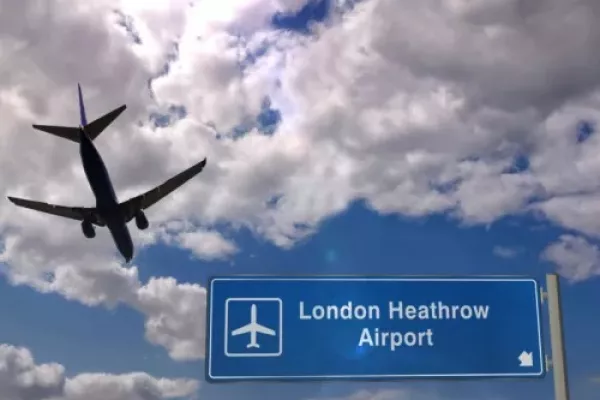London's Heathrow Airport asked airlines to stop selling tickets for summer departures on Tuesday 12 July, after it capped the number of passengers flying from the hub at 100,000 a day to limit queues, baggage delays and cancellations.
Details
Britain's busiest airport, like others across Europe, is struggling to cope as demand rebounds after the pandemic. Heathrow had between 110,000 and 125,000 daily passenger departures in July and August 2019.
Airlines at Heathrow had already responded to a government appeal to cut capacity, but the airport said it needed them to go further.
"Some airlines have taken significant action, but others have not, and we believe that further action is needed now to ensure passengers have a safe and reliable journey," CEO John Holland-Kaye said in an open letter on Tuesday.
"We have therefore made the difficult decision to introduce a capacity cap with effect from 12 July to 11 September."
"We recognise that this will mean some summer journeys will either be moved to another day, another airport or be cancelled and we apologise to those whose travel plans are affected," he added.
The London hub said the cap was in line with limits implemented at its rivals. Schiphol in the Netherlands has capped passenger numbers about 16% lower than 2019 levels, while Frankfurt has cut flights at peak times from 104 per hour to 94.
Heathrow said the average number of outbound seats still remaining in the summer schedules was 104,000 a day, 4,000 above its cap. It said on average 1,500 of these 4,000 seats had been sold to passengers.
"We are asking our airline partners to stop selling summer tickets to limit the impact on passengers," Holland-Kaye said.
British Airways ICAG.L, Heathrow's biggest customer, has already cut 10,300 short-haul flights between August and October to minimise disruption after the British government offered amnesty if airlines did not use their slots.
Willie Walsh, director general of the International Air Transport Association (IATA) and a former CEO of British Airways, said Heathrow should have gotten its act together after airlines predicted a strong rebound in traffic.
"They clearly got it completely wrong," he told Reuters.
Heathrow on Monday 11 July apologised for the long queues and baggage issues customers had endured in recent weeks, blaming staff shortages across the whole aviation sector.
In Face-Off With London Heathrow, Emirates Airline Says Won't Cut Capacity
The above news was followed by news that Emirates airline said on Thursday 14 July that it had rejected demands by London's Heathrow Airport to cut capacity despite being threatened with legal action, and intended to continue operating its six daily flights to Britain's busiest airport.
Heathrow this week asked airlines to stop selling some tickets for summer flights, limiting the number of passengers flying from the hub to 100,000 a day to ease pressure on operations that have been unable to keep up with demand.
Emirates, owned by the government of Dubai, said Heathrow had given the airline 36 hours from Wednesday 13 July to reduce capacity on its six daily flights, which are operated with the Airbus AIR.PA A380 superjumbo.
"Their communications not only dictated the specific flights on which we should throw out paying passengers, but also threatened legal action for non-compliance," the airline said.
"Until further notice, Emirates plans to operate as scheduled to and from (Heathrow)," it said in the statement.
Emirates, the world's biggest operator of long-haul jets, relies on international flights for its operations. Heathrow is one of the world's most important hubs, while Emirates has no domestic market to cushion from a drop in international traffic.
A Heathrow spokesperson said the airport had been forced to impose restrictions after months of consultations with airlines failed to deliver a solution, citing staff shortages as the main issue.
"We had no choice but to take the difficult decision to impose a capacity cap designed to give passengers a better, more reliable journey and to keep everyone working at the airport safe."
"It would be disappointing if instead of working together, any airline would want to put profit ahead of a safe and reliable passenger journey,” the spokesperson added.
Other airlines, such as Aer Lingus, have said they were awaiting guidance from Heathrow on how capacity limits would impact them, while some such as Etihad Airways say they have been forced to reschedule flights at short notice.
Global airline association IATA has criticized the cuts.
Emirates said tens of thousands of passengers would be affected if the airline did reduce capacity and that it was impossible to rebook travellers as upcoming flights were full.
A single Emirates A380 can carry more than 600 passengers.
CHARGES ROW
The airline accused Heathrow of incompetence and for having a "blatant disregard" for consumers. It urged Heathrow's shareholders to scrutinise decisions by its management team.
Emirates said dnata, a unit of parent Emirates Group that provides ground handling and catering services at Heathrow, was capable and ready to handle its flights there.
"So the crux of the issue lies with the central services and systems which are the responsibility of the airport operator."
Heathrow and other European airports have capped passenger numbers to ease congestion caused by surging demand and staff shortages following huge layoffs during the pandemic.
Signs that trouble was brewing between the world's largest international airline and Heathrow surfaced last month, when its president, Tim Clark, said the carrier had been given just hours' notice to scrap an A380 flight at Heathrow.
Emirates said it was not practical to move flights to other British airports and that 70% of those flying out of Heathrow were booked to catch connecting flights from Dubai, highlighting the impact the cuts would have on the airline if enforced.
The showdown follows a row between airlines and Heathrow about increases in the airport's charges per passenger.
Airlines have accused the airport of ignoring their warnings of surging demand in order to justify higher per-passenger charges, which tend to go up as the number of flyers goes down.
Heathrow rejects the accusations and says some airlines have themselves been slow to adapt to the post-pandemic travel rush.
Emirates said signs that travel would rebound sharply have long been clear. Its own Heathrow flights have been in high demand for months.
"(Heathrow) chose not to act, not to plan, not invest," Emirates said in a statement.
Analysts said it was not immediately clear how quickly the public standoff would escalate to involve other airlines.
"Heathrow is not going to want to provoke a legal battle with one of its major customers but how does it extricate itself from Emirates' insistence on keeping flying," said UK-based aviation analyst John Strickland.
Smaller airlines lack the Dubai carrier's muscle while some large carriers have already "fallen on their sword," he added.
News by Reuters, edited by Hospitality Ireland. Click subscribe to sign up for the Hospitality Ireland print edition.









